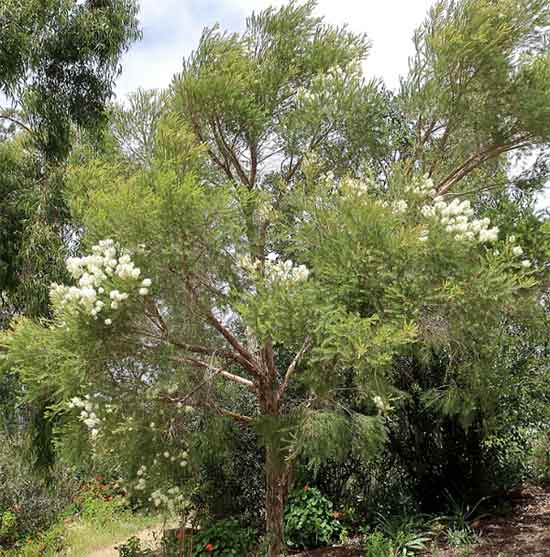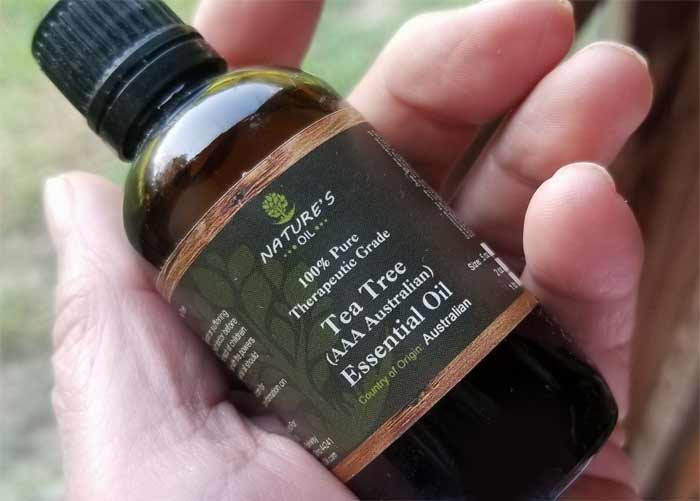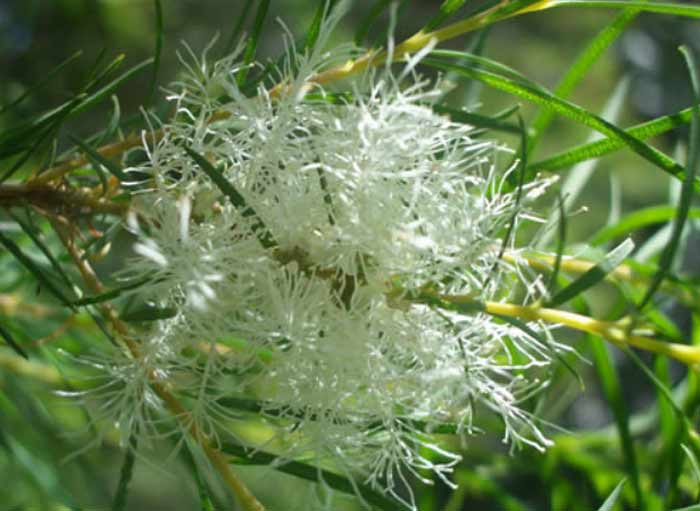Tea tree essential oil in herbal medicine

Tea tree oil (Melaleuca Alternifolia) is a natural insect repellant and good disinfectant.
It contains numerous compounds that kill bacteria, including ones that are resistant to prescription antibiotics.
Distilled from the leaves of the Melaleuca tree native to Australia, tea tree essential oil is used in herbal medicine and aromatherapy to treat everything from chest colds to toenail fungus.
Science and tea tree oil
Studies show that tea tree oil is antiseptic and anti-inflammatory. Full of terpenes, tea tree oil is proven to help treat coughs and colds.
Aborigines tell of healing lakes, where Melaleuca leaves had fallen and decayed over time. Bathing in the lakes cured all types of skin problems from rash to burns.
Tea tree oil was not produced until the 1920's, when the value of the plant was recognized.
Tea tree oil is effective against bacteria, fungi, virus, and protozoa. Not only is it useful in herbal medicine, it can also be used to stop the mosaic virus and other plant diseases.
Tea tree oil can be toxic if ingested, although there are no reports of death from tea tree oil poisoning.

Tea tree oil is a powerful, natural antibiotic.
Tea tree oil is known as the "oil of first aid". It is useful for treating external fungal, bacterial, and viral infections. Do not add it to tea, and do not take it internally.
Tea tree oil is good for lots of skin problems and including the following:
- Cracked rough skin
- Acne
- 1st degree burns
- Scrapes
- Boils
- Warts
- Blisters
- Chilblains
- Sunburn
- Athlete’s foot
- Toenail fungus
- Herpes outbreaks
- Fever blisters
- Insect bites
- Bee stings
- Varicose veins
- Dandruff
- Itchy scalp conditions
- Yeast infections
- Blisters caused by chicken pox or shingles
Tea tree essential oil is an immuno-stimulant.
Tea tree essential oil can stimulate the whole immune system into action.
Inhaling vapors from tea tree essential oil can help soothe colds, whooping cough, tuberculosis, asthma, and bronchitis symptoms.
For treating respiratory problems, use tea tree oil in a steam tent, an herbal bath, or inhale vapors directly from the bottle.
The fresh scent is pleasant with marvelous head-clearing effects.
Tea tree oil may also be mixed with a carrier oil and massaged into the chest area for night time relief.
If you have been reading my Every Green Herb blog for a while, then you know we grow and sell a variety of herbs, but we also buy a lot, too. Try our favorite herbal suppliers for quality and value.
How much tea tree oil do I use?
To treat external skin problems (but not open sores or deep puncture wounds), apply diluted tea tree essential oil at least two times a day. Use 3 drops of tea tree oil to a teaspoon of good carrier like cold-pressed olive oil. In stubborn cases, add a few more drop of essential oil, or add some frankincense essential oil to the mix.
For acne, dilute tea tree oil with a lighter carrier such as grape seed oil. Add a little lavender essential oil for extra strength.
For use in the treatment of toenail fungus, apply to the nail at full strength.
Tea tree oil causes less of a stinging sensation than some other antiseptics, but can still cause irritation if overused.
If you have been reading my Every Green Herb blog for a while, then you know we grow and sell a variety of herbs, but we also buy a lot, too. Try our favorite herbal suppliers for quality and value.
Tea tree essential oil can heal gum disease and mouth sores.
For mouth and gum infections use one drop on sore area or add to water and gargle like mouth wash. Do not swallow.
Tea tree oil can be massaged into the gums but must be rinsed and spit out after a few minutes. The use of tea tree oil in oral products like toothpaste is considered safe as long as the tea tree oil is not ingested and it is not used by small children.
Tea tree oil is an excellent scalp treatment.
Use tea tree oil for most dandruff and other scalp problems.
- Combine a few drops of tea tree essential oil with the same amount of eucalyptus essential oil.
- Mix the essential oils with a tablespoon of olive oil and massage into scalp.
- Leave on scalp overnight.
- Also use tea tree essential oil in water as a hair rinse, or add a few drops to any shampoo.
- Tea tree oil is also good in pet shampoos to help itchy skin conditions and to repel fleas.

Tea tree essential oil originates in Australia.
Tea tree oil comes from the melaleuca tree, an Australian evergreen with white spongy bark.
The oil is distilled from the leaves or “needles”.
Tea tree oil is used in cosmetics, herbal remedies, cleansers, household products, and more.
A few drops of tea tree oil can extend the shelf-life of handmade herbal products including ointments, creams, lotions, and massage oils.
Captain James Cook named the tree “tea tree” because his crew used the leaves as a tea substitute.
Tea tree leaves are also used to flavor beer.
Australian Aborigines have used tea tree oil for thousands of years for treating everything from abrasions to sore muscles. In Australia, tea tree oil is known as the “healing oil.”
Tea tree leaves are also useful.
The Melaleuca leaves are ground up and applied to wounds (or other skin problems).
Apply the powdered leaves, then cover with a warm compress. Healing begins immediately!
*Do not apply tea tree oil to broken skin or to a rash such as poison ivy, that is not caused by fungus. Never take tea tree oil internally. Before using tea tree essential oil on sensitive skin, a patch test should be done.
Always consult with your healthcare professional before using any herbal remedy.
Sources:
https://www.ncbi.nlm.nih.gov/pmc/articles/PMC1360273/
Blessings to you and yours!
Thanks so much for reading my blog. Jan.

*Note - the information on this website has not been evaluated by the Food and Drug Administration.
© 2005-2024 website design and content by Janice Boling